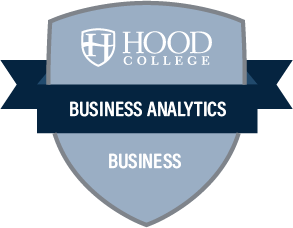Badge Overview
 Business Analytics
Business Analytics
Published Public {} Badge Class Data
Business Analytics

Issued by Hood College
Badge Description
Offered through The George B. Delaplaine Jr. School of Business at Hood College, the Business Analytics badge provides a comprehensive introduction to business analytics and data science for managers. In this course, learners will delve into key mathematical concepts, such as algebra, basic calculus, differentiation, vectors, matrices, and linear programming, while simultaneously exploring foundational statistical methods, including frequency distributions, measures of central tendency, elementary probability, hypothesis testing, non-parametric methods, linear regression, correlation, and analysis of variance. The course emphasizes the practical application of these concepts and techniques in managerial decision-making processes across various fields, equipping managers with the skills to effectively analyze data and make informed decisions.
Analytical Thinking
Statistical Modeling
Forecasting & Planning
Quantitative
Business Management
Makes Data-Driven Decisions
Badge Criteria
This FOUNDATIONAL level badge is equivalent to a 3-credit, master's level course. Earning a grade of B or better is required for this badge.
Aligned Outcomes
-
Internal
Core Competencies
https://www.hood.edu/offices-services/institutional-assessment/institutional-learning-outcomesGSO_ProbSolvProblem Solving
The badge earner will apply advanced disciplinary content knowledge and strategies to understand and address problems and questions relevant to their discipline and to which they have not previously been introduced.
-
Internal
Core Competencies
https://www.hood.edu/offices-services/institutional-assessment/institutional-learning-outcomesGSO_ProfProfessionalism
The badge earner will engage in legal, ethical and professional behaviors consistent with their discipline, including leadership, teamwork and/or other responsibilities to key stakeholders.
